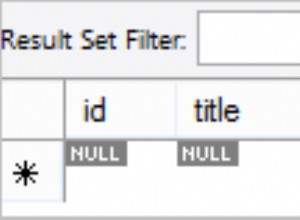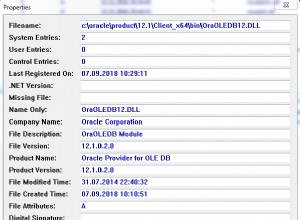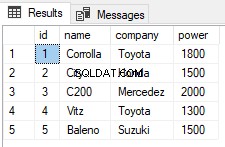Ho avuto una situazione simile:funzione con un ampio elenco di parametri. Con i cosiddetti parametri denominati , non è necessario rispettare un ordine di parametri. Il codice è più lungo, ma (spero) più leggibile e più robusto.
CREATE TABLE tab(name text, surname text, address text, city text, zip text);
CREATE OR REPLACE FUNCTION public.fx(name text, surname text,
address text, city text, zip text)
RETURNS void
LANGUAGE plpgsql
AS $function$
BEGIN
INSERT INTO tab(name, surname, address, city, zip)
VALUES(fx.name, fx.surname, fx.address, fx.city, fx.zip);
-- ... some other logic
END;
$function$
Questa funzione può essere chiamata con parametri denominati notazione:
SELECT fx(name := 'Pavel', surname := 'Stehule',
address := 'Skalice 12', city := 'Benesov', zip := '12');
Attenzione:quando utilizzo un tipo sbagliato - Postgres segnala il messaggio:
postgres=# SELECT fx(name := 'Pavel', surname := 'Stehule',
address := 'Skalice 12', city := 'Benesov', zip := 12);
ERROR: function fx(name := unknown, surname := unknown, address := unknown, city := unknown, zip := integer) does not exist
LINE 1: SELECT fx(name := 'Pavel', surname := 'Stehule',
^
HINT: No function matches the given name and argument types. You might need to add explicit type casts.
Il messaggio è valido, ma non è pulito. È un costo del supporto per il sovraccarico delle funzioni. C'è un altro trucco, come dividere un lungo elenco di parametri e come trovare questi problemi più comodamente.
Postgres supporta tipi personalizzati. Puoi usarlo:
CREATE TYPE person_type AS (name text, surname text);
CREATE TYPE address_type AS (address text, city text, zip text);
puoi scrivere una funzione di costruzione:
CREATE OR REPLACE FUNCTION public._person_type(name text, surname text)
RETURNS person_type
LANGUAGE plpgsql
AS $function$
DECLARE r person_type;
BEGIN
r.name = name;
r.surname = surname;
RETURN r;
END;
$function$
CREATE OR REPLACE FUNCTION public._address_type(address text, city text, zip text)
RETURNS address_type
LANGUAGE plpgsql
AS $function$ DECLARE r address_type;
BEGIN
r.address = address;
r.city = city;
r.zip = zip;
RETURN r;
END;
$function$
La creazione di questo sistema richiede un po' di lavoro ed è pratica solo per i sistemi a lunga durata. In seconda mano, riduce un costo per futuri lavori di manutenzione.
CREATE OR REPLACE FUNCTION public.fx(p person_type, a address_type)
RETURNS void
LANGUAGE plpgsql
AS $function$
BEGIN
INSERT INTO tab(name, surname, address, city, zip)
VALUES(p.name, p.surname, a.address, a.city, a.zip);
-- ... some other logic
END;
$function$
Ora sono possibili più notazioni (combinazione di notazioni):
postgres=# SELECT fx(_person_type('Pavel','Stehule'),
postgres(# _address_type('Skalice 12','Benesov', '25601'));
fx
----
(1 row)
I costruttori aiutano con la localizzazione degli errori:
postgres=# SELECT fx(_person_type('Pavel','Stehule'),
_address_type('Skalice 12','Benesov', 25601));
ERROR: function _address_type(unknown, unknown, integer) does not exist
LINE 2: _address_type('Skalice 12','Benesov', 25601));
^
HINT: No function matches the given name and argument types. You might need to add explicit type casts.




